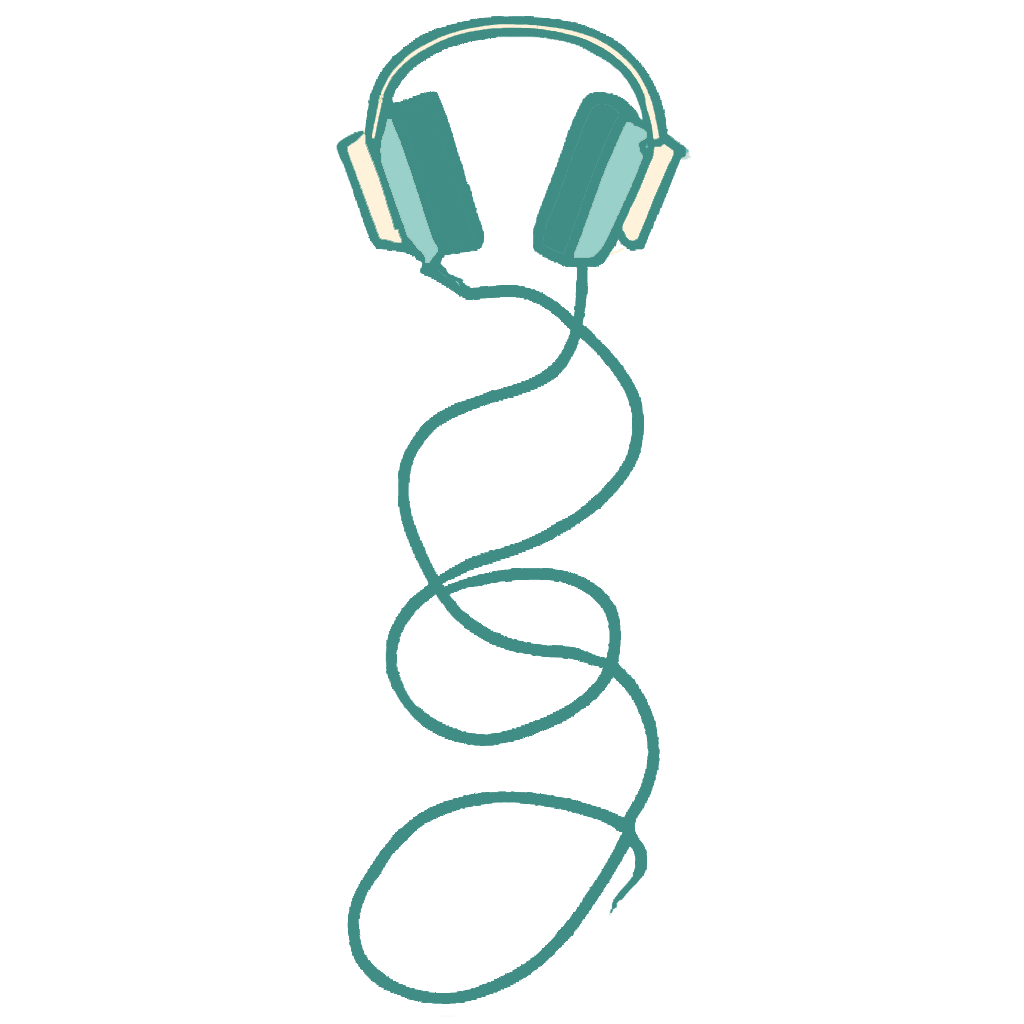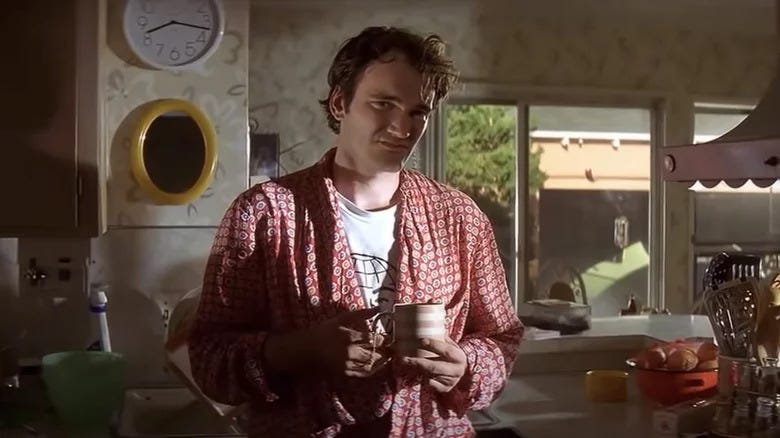Characters in kitchens drinking coffee
Prominent milk. A steaming mug of foley. A basket of Belgians. Minimal QT content.
Dear Students, Alumni, Faculty, and Trespassers,
Here at the film school, we see the winter festival as a break in time. In many ways, January 1st marks the end of one year and the beginning of another. It is a chance to rue the past or dread the future, depending if you’re a cup-half-empty or cup-half-full type.
Perhaps, like me, you have big cinema-related plans for 2023 and sincere doubts that you will realize them. If my plans come to fruition, the school will be able to provide extensive emotional and imaginative support to help you conquer your doubts. However, if my doubts are fulfilled, we will find ourselves in the same doomed boat. I believe this is known as ‘building a community.’
Anyway, on with the end-of-term school disco, as it were. Today, we will look:
To the past with an archived introduction to foley;
To the present with a dabble in List Discourse;
And to the future with an online exhibition opportunity.
Bonus: you will also find a previously unpublished homework exercise.
New instruction: Foley
Two years have passed since we broadcast our first video module with the Slow Film Festival: Something About Sound Design, Gardening & Mutants. For this month’s festive bulletin, let’s revisit a foundational instruction from the lecture.
If you’d never heard a duck speak, could you predict it would sound like that?
Isn’t it strange that a door creaks and squeaks? That a distant aeroplane whistles?
Sounds don’t sound like the things that make the sounds look. People know what made a given sound through experience and deduction, or through a process of triangulation (including assumptions based on movement and light). And not because there is a sensible illustrative link between what we see and what we hear.
Therefore: a movie sound can be recreated using a process that looks different to the footage to which the sound will be matched.
Foley artists everywhere can breathe a weird-sounding sigh of relief1.
It is the foley artist’s job to capture or conjure every sound the sound designer is missing for their movie. It would be a beautiful world if foley artists had to recreate every one of these sounds (a district attorney being slapped around the chops, a Martian spaceship lifting off, a fish jumping in the water) using the actual objects, processes, environment, and scale of the real thing. But foley artists can rest easy. Sounds don’t look like the thing that made them.
About that fish jumping in the water: there’s no point in taking a real fish and throwing it into a studio pool. A mandarin segment falling into a mug of tea sounds more like a fish than a fish does. We each foley an imaginary movie every day, if only somebody was recording it.
And here’s that homework exercise - perfect for the winter break!
You may share the results of your homework in the comments.
“Lists are for laundry…”
So writes Elena Gorfinkel, in her remarkable manifesto against film lists. Gorfinkel’s manifesto has resurfaced in the wake of the latest Sight and Sound Greatest Films of All Time poll. The results have been announced and the list is no longer as controversial as the act of listing in itself.
Funnily enough, I was just thinking about how rather than lists of films, we could try baskets. Which of course, are also for laundry.
A basket of films satisfying criteria A; a basket of films that you consider to be very B; a basket of films that contain C. The sleeves and partner socks of films in one basket draping over the edge of the next basket. Other, non-laundry items have found their way to the bottom of each one.
Or given that items in a basket are usually discrete, and film stuff is rarely discrete, perhaps a soup would be better. (With a basket of mixed breads on the side?) Chunks of Jeanne Dielman dissolving in a spicy Sátántangó broth, garnishes of Cléo sinking below the surface. What is the name of this soup?
Supercut it out
If we agree with Gorfinkel that “Lists are metrics” and that metrics “are our enemy, and the enemy of art and of political struggle,” and indeed that one should “Burn the list to free your ass” - then we must avoid the supercut, too. The supercut is a colonialist effort at mapping to possess, possessing to wield. In flattening the metric, the laptop warrior2 flattens everything else in their way.
A list should either be exhaustive or hyper-subjective. Or the list should strive to embody, in its title, structure, and arrangement, with humility, the absurdity of its existence. Which the Sight and Sound poll, in all its seriousness, does not. (Anyway, Dielman may be the greatest film of all time but isn’t even the bestest Belgian film.)
So let’s list:
Moments when you woke up during the second movie of a double bill having fallen asleep in the first.
Background objects that reappear in close-up in the sequel (but are purely incidental). (Densely annotated list).
Characters who say the line, “Excuse me, do I know you?” (Do not publish until we have all of them).
Escalators on which an extra shouts “Hey!” after the hero pushes past. (Is there a universal system for naming/numbering escalators?)
Shadows of horse ornaments on mantelpieces and dressers. (Infinite; which is to say, having read this sentence you will see them everywhere).
Background extras you still remember. (What are they doing with their lives?)
Ways in which the present film could be improved.
Dogs that look at the camera. (Acceptable supercut).
Scenes that nudge the surrounding movie out of an otherwise suitable category.
Lost, Lost, Lost
Talking of lists, there’s one at the foot of this email. It’s a reading list that I update for each newsletter with things I’ve recently consumed online3 that might be helpful for one department or another, although often in a roundabout sort of way.
It's a short one this time, but do check out this letter's film link, a perfect title for end-of-year downtime; it's great company that demands nothing but gets you giving all the same. It's about bees!
And here’s an opportunity for Unfoundlings. The people at Deluge Contemporary Art (home of the Antimatter Festival) are looking for work and play on lostness. There doesn’t seem to be a webpage about the call. But here’s what they wrote on Facebook:
Seeking artists’ moving image works for an online exhibition in spring of 2023. Working title “Let’s Get Lost.” Film and video that engage with ideas including a lack of referents, total immersion, submerged identity, new directions via synchronicity, etc. Artists fees will be paid. Links and info to curator@deluge.ca or deluge@antimatter.ca.
One last thought: suddenly everyone’s an editor when they’re reviewing Jeanne Dielman, 23 Commerce Quay, 1080 Brussels.
Thanks for reading.
~Graeme Cole.
(Principal)
Please support the school by forwarding this bulletin to curious colleagues:
End-of-class Handout: A Lateral Reading List
Criticism | Notebook Newsletter
Exhibition | "If you die in the game, you die in real life."
Festivals | Synthmas
Sound Design | Obsolete Sounds
🎥 The bonds between man and bee 🎥 | 👂 Listenography 👂
Why doesn’t a sigh of relief sound like a cooling breeze or vice versa? Why does it sound like a foreboding gust under the crack of a castle door and vice versa?
Missionary? Botanist?
Or re-consumed. Dupe links I shared weeks or months ago may occasionally come up again because I remember nothing.








